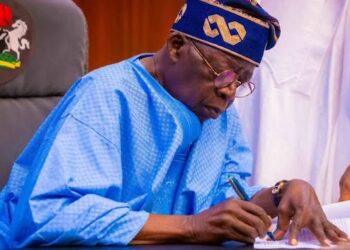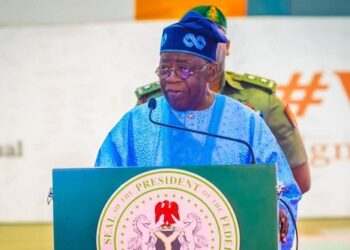With discontent mounting and Nigeria seeking to raise international debt, lenders and investors are waiting for President Muhammadu Buhari to announce a plan that could determine whether he keeps his promises to boost the economy and create millions of jobs.
Buhari’s economic blueprint for the next four years, due to be released this month, will aim to lift West Africa’s biggest economy from its worst slump in more than two decades and boost the annual economic growth rate to at least 7 percent by 2020, Budget and Planning Minister Udo Udoma told reporters and investors in the capital, Abuja, on Monday.
The recovery and growth plan for 2017 to 2020 comes after Buhari forced the central bank to maintain a currency peg for more than a year, curbing foreign investment, while the importers of certain raw materials and equipment are still banned from accessing dollars, denting manufacturing output. Buhari approved the 2016 budget almost five months after the start of the year, causing delays in spending and adding to the woes of an economy hurt by declining oil prices and output.
“This is the last opportunity,” Ayodele Akinwunmi, head of research at Lagos-based FSDH Merchant Bank Ltd., said on Tuesday. “If it has taken them two years to develop a plan, I don’t want to believe it won’t work, otherwise it will be total failure for this government.”
Ensuring macroeconomic stability, foreign-exchange availability and food and energy security are immediate priorities for the government, Udoma said this week. Part of the plan will be to boost oil production and revamp refineries, raise power generation, build food-processing zones, and invest in mines, and the government could sell assets and increase foreign borrowing to fund this, he said in an interview in October.
Fundraising Challenge
“The devil is in the details,” Pabina Yinkere, the Lagos-based head of research at Vetiva Capital Management Ltd., said by phone. “It’s those detailed strategies that will determine sources, and amount of money the government can raise to fund the plan. From the onset, fundraising will be a challenge.”
The African Development Bank in November released $600 million of the $1 billion it agreed to lend Nigeria, and said the rest will be disbursed after the lender knows the nation’s economic plan. The government is seeking a $1 billion loan from the World Bank, and officials are meeting with investors in the U.K. and U.S. in preparation for the sale of a $1 billion Eurobond. China has pledged several financing packages totaling $40 billion for Nigeria’s infrastructure over an unspecified period.
“The Eurobond is an easy one, and will be oversubscribed because of its small size and huge demand,” Yinkere said. “But lenders like the World Bank might have conditions on things like the foreign-exchange regime, and subsidies, while China will have several trade-offs in exchange for its money.”
While the Central Bank of Nigeria removed a 197-199 per dollar peg in June, causing the naira to lose about 40 percent its value against the U.S. currency, it continues to intervene to keep the naira at around 315 per dollar and it blocks importers of 41 items it deems non-essential from the official foreign-currency market. The scarcity of dollars has forced some importers to buy foreign currency on the black market at about 30 percent more than the official rate, pushing inflation to an 11-year high.
The naira strengthened 0.3 percent at 315.10 against the dollar by 8:45 a.m. in Lagos, on Wednesday, according data compiled by Bloomberg, while abokiFX.com reported it closing at 495 on the black market on Tuesday.
The AfDB wants to see reforms in the energy industry to include cost-reflective power tariffs to encourage investment, said the lender’s president, Akinwumi Adesina. Investec Bank Ltd.’s head of Africa strategy and sales, Andrew Schultz, said Nigeria should follow Egypt’s lead and allow its currency float freely so portfolio flows can return, even as these decisions may raise inflationary pressures, rendering them non-populist and difficult for Buhari to make almost halfway into his term.
Jobs Promised
Buhari, whose current term ends in 2019, pledged to increase economic growth to 10 percent and create 1 million jobs annually when he asked Nigerians for their votes two years ago. While Buhari remains in the U.K. for medical tests, a civic-group coalition called for protests this week in Abuja and Lagos, the commercial capital, against worsening economic conditions. Gross domestic product probably contracted 1.5 percent in 2016, according to the International Monetary Fund, and the unemployment rate has climbed every quarter since the end of 2014, to 14 percent in the three months through September.
“The plans look very good on paper, and because of the election cycle nearing, they will want the plan to deliver very quickly, and have very visible results,” Schultz said by phone from Johannesburg on Feb. 6. “But the progress, and meaningful results, will be seen in two years. The effectiveness of the plan will depend on how Nigeria deals with foreign-currency issues.”









